Published: 10 January 2024
Last updated: 20 March 2024
In the third part of his series on Israel's media, ITTAY FLESCHER explores the English-speaking podcasts the explain Israel to the world.
There is something about the intimacy of a podcast that makes it unlike any information medium we have known in the past. A well-made podcast gives the listener a feeling that each episode was made personally for them, as though they had been invited to eavesdrop on a private conversation.
This sense of personal communication makes podcasting a popular source of news and information. A recent survey found that 38% of Australians had listened to a podcast in the past month.
There are hundreds of podcasts that explore almost every aspect of Israeli life, including the current Israel-Hamas war. The 10 highlighted here may be of special interest to The Jewish Independent readers looking for balanced and informed commentary and opinion about how we reached this point in history, and what this means for our future.
News and analysis to keep you up to date
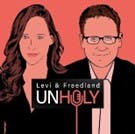
Unholy: Two Jews on the News
Israeli TV anchor Yonit Levi and London-based Guardian journalist Jonathan Freedland, host this weekly conversation unpacking how the news affects them personally from their perspective as a Jewish Israeli and a Diaspora Jew. It’s currently the most listened-to English language podcast in Israel and for good reason. Their honesty and often heartfelt reflections frame the news with deeply personal lenses. They model thoughtful Israel-Diaspora dialogue, at a time when Diaspora voices who are not wholly supportive of Israel are often silenced.
They also bring in weekly guests to interview, often authors, politicians or other journalists who have insights into this unfolding story. Bringing humour and wit to close each episode, they distribute ‘chutzpah’ and ‘mensch’ awards to worthy candidates from across the Jewish world.
To mark 30 days since the war began, Unholy had a powerful conversation called “War Therapy”, exploring the deep chasm between Israelis who unquestioningly support the war and Diaspora Jews who want to stand with Israel, but can’t stomach the horrific pictures they see from Gaza, and many Israelis, who are not being exposed to the experience of Palestinians in Israeli media.
This theme comes up again in the episode on war journalism called “The light we cannot see.” Both are highly recommended.
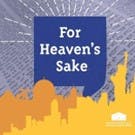
For Heaven’s Sake
Hosted by the Hartman Institute scholars and Jerusalem residents Rabbi Donniel Hartman and Yossi Klein Halevi, this podcast goes deep on all dimensions of the war and how the week's news can be seen as a mirror to the existing tensions and trends within Israeli society.
A sister podcast called Identity/Crisis, hosted by Yehuda Kurtzer, does the same from a US perspective. It provides fascinating interviews with gap year students, explores the response of the US left to October 7, and looks at crisis mobilisation efforts.
For those who believe that Liberal Zionism is a force more relevant than ever in these days when those two ideologies feel like an oxymoron to many leftists, this podcast is a must.

The Ezra Klein Show
One of many podcasts produced by the New York Times, The Ezra Klein show is not usually about Israel/Palestine, but since October 7, it has covered the war in several episodes, contributing greatly to the thinking of thousands of liberals and progressives across America.
Most notable was a beautiful episode with Rabbi Sharon Brous called “The Sermons I need to Hear Right Now.” It was a moving conversation about the relationship between Jewishness and the Jewish State, about believing some aspects of Israel have become indefensible and also believing that Israel itself must be defended. It powerfully asked, “What does it mean when a religion built on the lessons of exile creates a state that inflicts exile on others? And what about the ugly, recurrent reality of antisemitism?”
The episodes with Israel Policy Forum fellow Nimrod Novick called “A different path Israel could have taken and maybe still can” and with historian Tareq Baconi called “This is how Hamas is seeing this” each provided great insight into dominant Israeli and Palestinian perspectives on the war.
If you are person who appreciates a deep dive into highly analytical policy analysis, this one is for you.
Human stories to bridge the divide
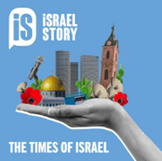
Israel Story
Based on the successful model of This American Life, Israel Story has been a popular podcast produced both in English and Hebrew for many years. It is currently the most listened-to Jewish podcast in the world.
It shares deeply personal stories from people spanning the breadth of social, religious and political discourse, voices we don’t usually hear or haven’t seen highlighted elsewhere.
Usually a long-form podcast, Israel Story has pivoted since October 7 to produce short-form interviews capturing snapshots of lived experience called “Wartime Diaries”. These include a CEO of a Jewish philanthropic organisation leading the Jerusalem volunteer centre, a woman with three small children whose husband is serving in the war, an evacuee from Sderot, a gay man who fought to have his relationship recognised after his partner died fighting on October 7, and a peace activist mourning the loss of a dear friend killed in Gaza.
At the end of each interview, the people featured felt like friends, as if I had just shared a Shabbat meal with them. The listener comes away with a far more intimate understanding of the challenges regular Israelis face at this time.
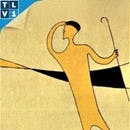
The Promised Podcast
Few podcasts model the ideal of “hugging and wrestling” with Israel as well as The Promised Podcast, hosted by Noah Efron and Allison Kaplan Sommer. An insider view of how this country can warm your heart and make your blood boil.
Since the war began, this podcast has been both a source of news and of comfort for liberals who see the dream of Israel falling apart before them. The addition of Sally Abed, a Palestinian resident of Haifa who is on the leadership team of Standing Together as a semi-regular co-host over the past year has deepened the conversation. Rather than a debate between various views on the Israeli left, it now provides much more of a conversation about the Jewish-Arab divide and what it means for Israel to be a shared home for two nations.
One of the most special aspects of this podcast is the “vat a country” segment at the end of each episode, where each panellist shares a unique moment from the past week. Unlike the “Only in Israel” lists we often see on hasbara sites, the manner and depth of the stories that appear in the segment are deeply affecting, often more so than the political debate that precede them.
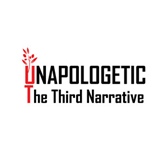
Unapologetic - The Third Narrative
Launched in response to the October 7 attacks, Unapologetic is a rare beast, hosted by Palestinian Israelis speaking in English with a specific focus on addressing Jewish and international audiences.
Hosts and peace activists Ibrahim Abu Ahmad from Nazareth, and Amira Mohammed from East Jerusalem draw on their experience facilitating dialogue and their lived experience as Palestinians, making it more intimate and honest than political.
In Unapologetic, instead of being reduced to chess pieces in some international power struggle, ordinary people are given a voice. By stepping beyond the traditional attitudes that dominate public opinion today, which hold no space for the suffering and humanity of the other, the podcast leaves the listener more confident and open to the idea that another way is possible.
Early episodes have explored Arab, Israeli and Palestinian identities, what the hosts call the “two-state delusion”, and what they would like to see happen the day after the war. The most recent featured an interview with Palestinian peace activist Hamze Awade from Ramallah, on his decision to speak at a joint Jewish, Christian, and Muslim peace vigil in London.
History lessons to help you understand
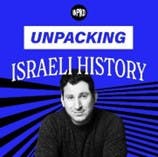
Unpacking Israeli History
This podcast invites the listener to go behind the scenes of Israeli history with self-confessed history nerd Noam Weissman. Each week, he offers a fresh perspective on some of the most controversial and interesting events in the country’s history. If you’ve ever wanted to know more about what Israel is all about –from multiple angles and viewpoints — this is the podcast for you.
Early episodes explored the complicated histories around the expulsion of Jews from Gush Katif, Dir Yassin, the Altalena, the Rabin Assassination, Baruch Goldstein, the Eichmann Trial, and an intriguing episode about how the Israeli national anthem Hatikvah came to be written.
Recently, the podcast has become less historical and more contemporary, questioning whether Israel should ransom hostages, sharing reflections with October 7 survivors, and exploring the meta-narratives of the Israel-Hamas War.
With each episode being meticulously scripted and researched, this is an especially useful resource for Jewish educators who are looking to bring new stories into the classroom to aid their teaching of Zionist history.
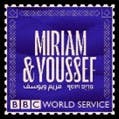
Miriam and Yousef
Imagine what would happen if the film Exodus, which idealises the Zionist narrative, and the TV series The Promise, based on the Palestinian narrative, were combined into one as a podcast?
In 2020, one of Britain’s most successful playwrights, Steve Waters, took on the task of this parallel history project with an ambitious 10-part drama about the birth of the State of Israel for the BBC World Service.
“Miriam and Youssef” is about two young and idealistic people — one a Jew from Eastern Europe, the other a Palestinian Arab.
Reflecting its British narrator’s worldview, the narrative arc begins in 1917 with Youssef explaining the Balfour Declaration for his parents, who can’t read English. They ask, “Does this mean the British are our friends or our enemies?”
Listeners are then transported to Eastern Europe and introduced to Miriam, a Jewish child who reads the works of AD Gordon and dreams about Zion as she convinces her family they must leave their home to escape the fast-approaching Cossacks. She and her mother make the long journey to Palestine to find her long-lost cousin David Gruen from Plonsk, who turns out to be David Ben Gurion.
By the last episode in 1948, Miriam and Youssef bear the scars of Dir Yassin, the Hadassah Convoy Massacre, and many other tragedies and the listener contemplates how the birth of Israel irrevocably impacted their lives forever for worse and for better.
Australian perspectives tailored for downunder
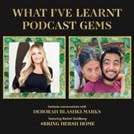
What I’ve learnt
This interview-based podcast mines Deborah Blashki-Marks interviews with creatives and other influential people for instructive and affecting stories. It isn’t a specifically Israel or Jewish podcast, but a number of recent interviewees are Israelis affected by the event of October 7.
Rachel Goldberg-Polin, whose son Hersh was kidnapped speaks about a poem she wrote called ‘One Tiny Seed,’ in which she shares both her grief and a message for a woman in Gaza. When Blashki-Marks asks about how she finds empathy in the midst or her pain, she refers to the late Professor Mark Baker as an inspiration. He taught her the Mordechai Gebirtig poem Yankele, which ends with the line “Your mother will cry a thousand tears before you grow to be a man.”
In another episode Blashki-Marks interviews Guy Shahar, a cousin of Ravid Katz, a Hamas hostage killed in Gaza, and of Doron Asher Katz, who was taken hostage with her two daughters and released on November 24.
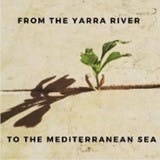
From the Yarra River to the Mediterranean Sea
Finally, a little self-promotion. From the Yarra River to the Mediterranean Sea is my podcast, hosted with Hannah Baker. It’s a conversation between two Jews, one in Melbourne and the other in Jerusalem.
Each episode touches on a different theme relating to the experience of Australian Jews on the left during this war. Conversations range from the hosts' experiences in Jewish day schools to the importance of learning history from both Zionist and Palestinian perspectives, with a clear bias towards promoting voices of tolerance and coexistence.
Recent guests have included Israeli peace activist from A Land for All, Mushon Zer Aviv, Palestinian journalist Lana Ikelan, and Maoz Inon, who lost both his parents on October 7, yet believes that war is not the answer to the shared future he dreams of in the twice-promised land.
This podcast seeks to break the binaries and labels of pro-Israel and pro-Palestine and start deeper conversations.
READ MORE FROM THIS SERIES
Who's who on Israel's TV News
Who’s who in Israel’s print media




